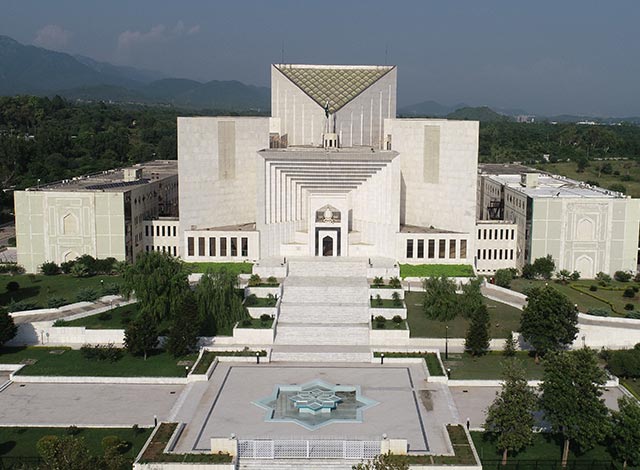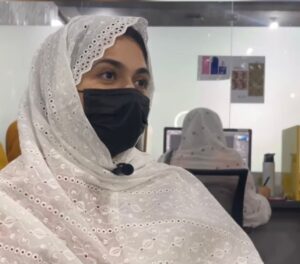PESHAWAR – The Supreme Court of Pakistan, in a landmark 7-5 majority decision, accepted review petitions and revoked PTI’s reserved seats allocation, overturning its July 12, 2024, ruling.
The Constitutional Bench upheld the Peshawar High Court’s March 2024 decision, denying the Sunni Ittehad Council (SIC), backed by Pakistan Tehreek-e-Insaf (PTI), access to reserved seats for women and minorities. This ruling transfers PTI’s reserved seats to the ruling coalition, including Pakistan Muslim League-Nawaz (PML-N), Pakistan Peoples Party (PPP), and other parties, reshaping Pakistan’s parliamentary dynamics.
Also Read: Supreme Court grills officials over illegal use of case property vehicles in KP
Led by Justice Aminuddin Khan, the 10-member Constitutional Bench concluded hearings after Attorney General Mansoor Usman Awan presented arguments. The majority, comprising Justices Aminuddin Khan, Musarrat Hilali, Naeem Akhtar Afghan, Shahid Bilal Hassan, Muhammad Hashim Khan Kakar, Aamer Farooq, and Ali Baqar Najafi, declared the July 12 decision unconstitutional. The court reinstated the PHC’s ruling, which rejected PTI’s reserved seats claim through SIC, citing the council’s failure to contest elections or submit candidate lists by the January 24 deadline.
Justices Muhammad Ali Mazhar and Syed Hasan Azhar Rizvi conditionally approved the review petitions, while Justice Jamal Khan Mandokhail upheld his stance on PTI’s reserved seats, supporting their claim to 39 seats but agreeing to review the remaining 41. Justices Ayesha A. Malik and Aqeel Ahmed Abbasi had earlier dismissed the petitions, and Justice Salahuddin Panhwar recused himself after objections from SIC’s counsel, Hamid Khan, regarding the bench’s composition post the 26th Constitutional Amendment.
Also Read: Supreme Court to Hear KP Universities Vice Chancellors Appointment Case on April 15
Background of PTI’s Reserved Seats Dispute
The PTI’s reserved seats controversy arose after the 2024 elections, where PTI-backed independents, stripped of their party symbol, joined SIC to claim reserved seats. On March 14, 2024, the Peshawar High Court rejected SIC’s petitions, prompting an appeal to the Supreme Court. The July 12 ruling initially granted PTI 39 reserved seats, with 41 candidates given 15 days to confirm affiliation. However, the Election Commission of Pakistan (ECP) and the National Assembly did not implement this, leading to review petitions by PML-N, PPP, and ECP in July and August 2024.
The Constitutional Bench ruled that SIC, as a non-contesting party, was ineligible for PTI’s reserved seats. Justice Mandokhail emphasized that independent candidates joining a non-parliamentary party violated constitutional principles. The court directed the ECP to reassess nomination papers within 15 days to determine candidate affiliations and reallocate PTI’s reserved seats to eligible parties.
Also Read: Justice Yahya Afridi nominated as New Chief Justice of Pakistan
This decision strengthens the ruling coalition’s parliamentary majority, potentially securing a two-thirds majority in the 336-member National Assembly. PML-N’s seats may rise from 110 to 125, PPP from 70 to 74, and JUI-F from 8 to 11. PTI, with 92 seats, faces a significant setback, losing influence despite its electoral success. PTI leaders, including Gohar Ali Khan, called the ruling a “gross injustice,” vowing protests to reclaim PTI’s reserved seats.
Reactions and Future Implications
Legal experts and PTI supporters criticized the verdict, with Barrister Asad Rahim Khan labeling it a “judicial surrender” that unfairly bolsters the ruling coalition. PTI’s official X account termed the decision the “funeral of justice,” highlighting the loss of 78 reserved seats, including 66 for women and 11 for non-Muslims. The live-streamed proceedings underscored public interest in PTI’s reserved seats case, marking a historic moment for the Constitutional Bench.
The ECP now faces the task of redistributing PTI’s reserved seats, potentially altering Pakistan’s legislative balance. As PTI plans protests, the ruling coalition’s enhanced majority could pave the way for constitutional amendments, intensifying political tensions.












